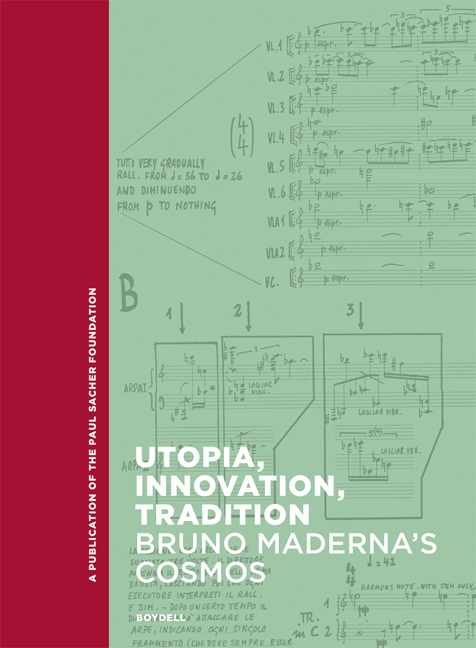Book contents
- Frontmatter
- Contents
- INTRODUCTION
- STAGING AND PERFORMING SOUNDS: A GLANCE THROUGH THE LAST THEATRICAL WORK
- BUILDING SOUNDS: THE COMPOSER
- CREATING SOUND: THE MUSIC BEYOND/WITHOUT THE STAGE
- REINVENTING SOUNDS: DIALOGUES WITH MUSIC OF EVERY EPOCH AND STYLE
- ACROSS BORDERS: THE CONDUCTOR AND THE INTERPRETER
- SEARCHING FOR ROOTS: THE DEVELOPMENT OF A STYLE
- STAGING AND PERFORMING TEXTS: A GLANCE THROUGH EARLY DRAMATURGICAL AND VOCAL WORKS
- Chronology Of Bruno Maderna’s Works
- Selected Bibliography
- Index
Delving into Bruno Maderna’s Satyricon: The Looking Glass World of Storytelling, Performance Interference, and Authorship
Published online by Cambridge University Press: 17 January 2024
- Frontmatter
- Contents
- INTRODUCTION
- STAGING AND PERFORMING SOUNDS: A GLANCE THROUGH THE LAST THEATRICAL WORK
- BUILDING SOUNDS: THE COMPOSER
- CREATING SOUND: THE MUSIC BEYOND/WITHOUT THE STAGE
- REINVENTING SOUNDS: DIALOGUES WITH MUSIC OF EVERY EPOCH AND STYLE
- ACROSS BORDERS: THE CONDUCTOR AND THE INTERPRETER
- SEARCHING FOR ROOTS: THE DEVELOPMENT OF A STYLE
- STAGING AND PERFORMING TEXTS: A GLANCE THROUGH EARLY DRAMATURGICAL AND VOCAL WORKS
- Chronology Of Bruno Maderna’s Works
- Selected Bibliography
- Index
Summary
The vast canvas of Petronius’ famous satirical masterwork presents a tumultuous image of life in the Rome of the Emperor Nero. It is a work of endless comic and savage detail, rich in character and contrast, without narrative continuity, an “action painting” of life lived with vulgarity, cruelty and an unforgettable intensity.
In Maderna's delicious collage, our musical history parades past us as if we were watching the last supper of all western culture – and the frieze of Petronius has found a new life for the theatre.
Our stage realization has evolved using the improvisational and aleatoric techniques of the score. An ordering of the varied narrative elements has been found and the sung music has been given visual and dramatic counterpoint through the presence of seven servants/slaves, mimes and clowns who give us the feel of the other half of society. We hope that we have, in a fresh and modern idiom, found a way to present a dream-like mosaic of life of both the Roman past and the present day.
This is how Ian Strasfogel presented Maderna's latest stage work in the program notes printed for the Dutch premiere on 16 March 1973 (→ EX. 1). His words are the starting point for what is meant to be a round trip through the history of Satyricon, in an attempt to find answers not only to questions that are still open today, but also to new doubts that have never been raised before. In the first stages, which look back, we will dwell on the re-reading of some interpretive facts that are well-rooted in the work's history and then try, through the filter of new awareness and recently unearthed documents, to establish some fixed points in a timeline that still requires clear definition. The need for a temporal (re)orientation stems from the analysis of the various ambiguities and inconsistencies surrounding the data and circumstances of some of the developmental stages in its genesis; the hectic days that accompanied its first staging and the performances that immediately followed; and, again, the editorial history of the work. The resulting misunderstandings have, in turn, had a tangible impact on concepts that often prove tricky when applied to Maderna and his works: those of “authorship” and “version” (within the field of the performance).
- Type
- Chapter
- Information
- Utopia, Innovation, TraditionBruno Maderna's Cosmos, pp. 19 - 58Publisher: Boydell & BrewerPrint publication year: 2023



